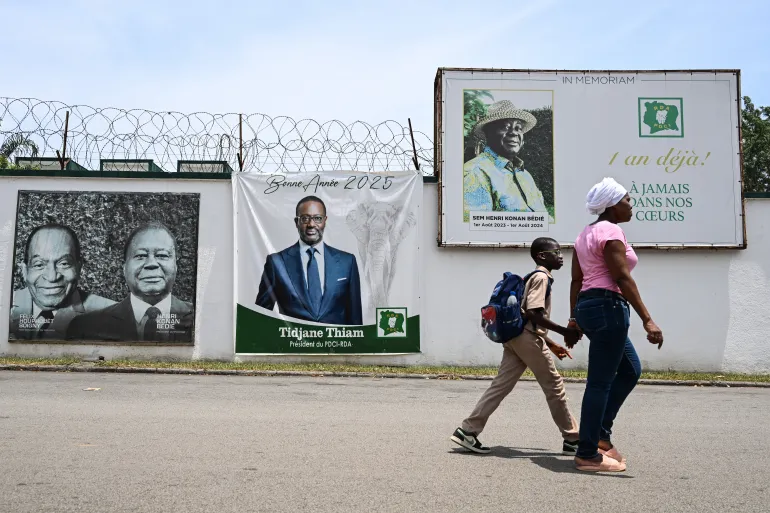
ABIDJAN, Ivory Coast — October 24, 2025 — As Ivory Coast approaches its most contentious election in years, thousands of Ivorians are voicing outrage over what they call a “flawed and rigged” electoral system. Civil society groups and opposition movements have called for mass shutdowns and boycotts, accusing President Alassane Ouattara of tightening his grip on power as he seeks a fourth presidential term.
Tensions have reached boiling point across the country’s largest cities, with residents fearful of a return to violence that has marked past elections. In Abidjan’s working-class district of Yopougon, bustling markets and nightlife have fallen silent at dusk as police trucks patrol streets once filled with music and laughter.
“Ivorians are living in fear,” said Jean, a 42-year-old civil servant. “People remember 2002, 2010, 2020 — every election brings violence. We just want peace.”
Election Under Heavy Security and Rising Fear
The Ivorian government has deployed 44,000 security personnel across the country, claiming the move will “ensure a peaceful vote.” Yet the atmosphere is anything but calm. Since campaigning began on October 10, protests have erupted in several cities, met with tear gas, mass arrests, and sweeping bans on public gatherings.
The October 25 presidential election pits Ouattara, 83, against five other candidates — including former First Lady Simone Gbagbo, business leader Jean-Louis Billon, and Henriette Lagou — though analysts say none pose a serious challenge to the incumbent.
Critics argue Ouattara’s decision to run again undermines democracy. A constitutional change enacted during his tenure reset term limits, allowing him to seek re-election for what many see as an unconstitutional fourth term.
Opposition Leaders Barred and Arrested
The country’s two major opposition parties — the African People’s Party of Ivory Coast (PPACI) and the Democratic Party of Côte d’Ivoire (PDCI) — have boycotted the vote after their leaders, including former president Laurent Gbagbo and Tidjane Thiam, were barred from the ballot.
“We have called for months of dialogue to ensure a fair, inclusive election,” said Bredoumy Soumaila, spokesperson for Thiam’s party, speaking from exile. “But the process is already rigged. This is not democracy.”
More than 700 opposition supporters have been detained, according to local NGOs. At least 80 protesters have been charged with “acts of terrorism.” Rights groups, including Amnesty International, condemned the crackdown, urging authorities to release peaceful demonstrators immediately.
Pulcherie Gbalet and the Civil Resistance Movement
Among the most vocal critics is Pulcherie Gbalet, president of the civil society platform Alternative Citoyenne Ivoirienne. Once jailed for organizing peaceful protests, Gbalet has gone underground but continues to call for a total nationwide shutdown to paralyze the government and force dialogue.
“They are hunting me, but I will not stay silent,” she said in a video message. “Ivorians must stop everything — no work, no school, no business — until this sham election is cancelled.”
Her campaign has found support online, particularly among youth frustrated with unemployment, corruption, and political repression. Yet on the streets, many remain too afraid to protest amid a heavy police presence.
History of Electoral Violence
Analysts warn the situation is volatile in a country still haunted by its violent political past. The 2010 post-election conflict left over 3,000 people dead, while the 2020 vote claimed 85 lives.
“Every election in Côte d’Ivoire since 1995 has been marked by bloodshed,” political scientist Geoffroy Kouao told Al Jazeera. “Our political elite has failed to learn from history. Power is pursued not through democracy but through domination.”
Human rights activist Boga Sako Gervais added that Ouattara’s rule has “hollowed out democracy,” claiming the president controls the executive, legislature, and judiciary.
“Under Ouattara, freedom of expression is criminalized. We live under a dictatorship,” said Gervais, now in exile.
Calls for Peaceful Dialogue
While opposition figures push for a nationwide shutdown, others are appealing for calm. Adrienne Amani, a 40-year-old social worker, believes only negotiation can prevent bloodshed.
“We must go back to the table,” she said in Abidjan. “If we don’t talk, we risk repeating the tragedies of our past.”
Fearing instability, over 1,500 Ivorians have fled to Ghana, while others stockpile food and fuel in anticipation of unrest. Businesses in Abidjan are scaling back operations ahead of the vote.
Still, Ouattara’s supporters insist the election should proceed. “The only option is to vote,” said Yeo Mamadou, a government supporter in Koumassi. “We need stability.”
But skepticism runs deep. “Will there even be an election?” asked Marius, a street vendor. “If the opposition blocks it and the government pushes forward, it could end in blood. We’ve seen this story before.”


Leave a Reply